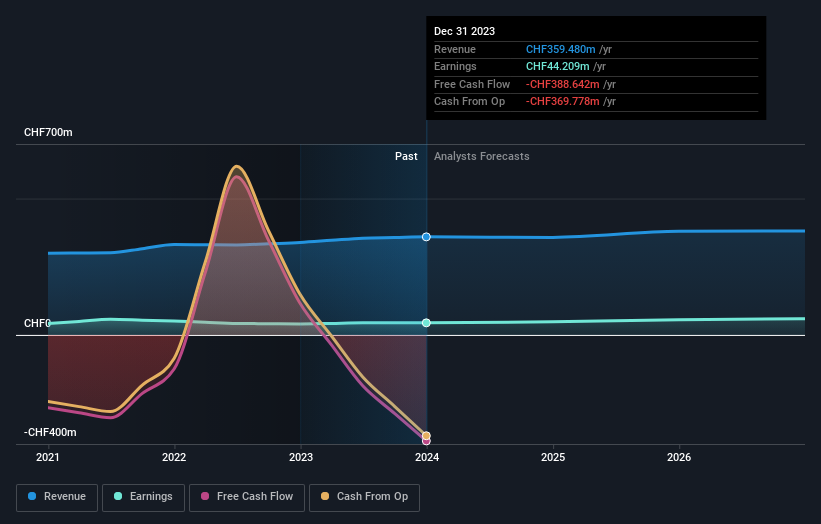- Switzerland
- /
- Capital Markets
- /
- SWX:VPBN
VP Bank AG Just Missed Earnings - But Analysts Have Updated Their Models

VP Bank AG (VTX:VPBN) last week reported its latest annual results, which makes it a good time for investors to dive in and see if the business is performing in line with expectations. Revenues of CHF359m were in line with forecasts, although statutory earnings per share (EPS) came in below expectations at CHF7.19, missing estimates by 6.1%. Following the result, the analysts have updated their earnings model, and it would be good to know whether they think there's been a strong change in the company's prospects, or if it's business as usual. We've gathered the most recent statutory forecasts to see whether the analysts have changed their earnings models, following these results.
Check out our latest analysis for VP Bank

Taking into account the latest results, VP Bank's three analysts currently expect revenues in 2024 to be CHF357.6m, approximately in line with the last 12 months. Statutory earnings per share are predicted to step up 11% to CHF7.98. Before this earnings report, the analysts had been forecasting revenues of CHF367.5m and earnings per share (EPS) of CHF8.45 in 2024. The analysts are less bullish than they were before these results, given the reduced revenue forecasts and the minor downgrade to earnings per share expectations.
It'll come as no surprise then, to learn that the analysts have cut their price target 17% to CHF87.67. That's not the only conclusion we can draw from this data however, as some investors also like to consider the spread in estimates when evaluating analyst price targets. The most optimistic VP Bank analyst has a price target of CHF110 per share, while the most pessimistic values it at CHF70.00. There are definitely some different views on the stock, but the range of estimates is not wide enough as to imply that the situation is unforecastable, in our view.
These estimates are interesting, but it can be useful to paint some more broad strokes when seeing how forecasts compare, both to the VP Bank's past performance and to peers in the same industry. These estimates imply that revenue is expected to slow, with a forecast annualised decline of 0.5% by the end of 2024. This indicates a significant reduction from annual growth of 2.4% over the last five years. Compare this with our data, which suggests that other companies in the same industry are, in aggregate, expected to see their revenue grow 6.6% per year. It's pretty clear that VP Bank's revenues are expected to perform substantially worse than the wider industry.
The Bottom Line
The most important thing to take away is that the analysts downgraded their earnings per share estimates, showing that there has been a clear decline in sentiment following these results. Unfortunately, they also downgraded their revenue estimates, and our data indicates underperformance compared to the wider industry. Even so, earnings per share are more important to the intrinsic value of the business. Furthermore, the analysts also cut their price targets, suggesting that the latest news has led to greater pessimism about the intrinsic value of the business.
Following on from that line of thought, we think that the long-term prospects of the business are much more relevant than next year's earnings. We have estimates - from multiple VP Bank analysts - going out to 2026, and you can see them free on our platform here.
Before you take the next step you should know about the 1 warning sign for VP Bank that we have uncovered.
New: Manage All Your Stock Portfolios in One Place
We've created the ultimate portfolio companion for stock investors, and it's free.
• Connect an unlimited number of Portfolios and see your total in one currency
• Be alerted to new Warning Signs or Risks via email or mobile
• Track the Fair Value of your stocks
Have feedback on this article? Concerned about the content? Get in touch with us directly. Alternatively, email editorial-team (at) simplywallst.com.
This article by Simply Wall St is general in nature. We provide commentary based on historical data and analyst forecasts only using an unbiased methodology and our articles are not intended to be financial advice. It does not constitute a recommendation to buy or sell any stock, and does not take account of your objectives, or your financial situation. We aim to bring you long-term focused analysis driven by fundamental data. Note that our analysis may not factor in the latest price-sensitive company announcements or qualitative material. Simply Wall St has no position in any stocks mentioned.
About SWX:VPBN
VP Bank
Provides wealth management and investment advisory services for private and institutional investors in Liechtenstein, rest of Europe, and internationally.
Excellent balance sheet average dividend payer.
Market Insights
Community Narratives



